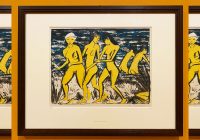Iphigenie in der Volksbühne Berlin
Von Holger Jacobs
13.01.2018
english text below
Iphigenie aus der griechischen Mythologie als Casting Show mit syrischen Flüchtlingen
Handlung
Die Sage von Iphigenie, die so viele Dichter inspiriert hat, erzählt von der Überfahrt König Agamemnons vom griechischen Festland zur Küste Kleinasiens, wo er zusammen mit König Menelaos gegen Troja in den Krieg ziehen will. Als sie während der Überfahrt die Insel Aulis erreichen, kommt es zu einer Windstille, die jede Weiterfahrt unmöglich macht. Der Gott der Jagd Artemis will damit König Agamemnon bestrafen, da er einen Hirschen in seinem heiligen Hain getötet hat. Der Seher Kalchas weissagt, dass eine Weiterfahrt nur möglich wird, wenn Agamemnon seine eigene Tochter Iphigenie den Göttern opfert. Agamemnon tut wie ihm geheißen, doch im letzten Moment rettet Artemis die Tochter vor dem Feuertod und bringt sie auf die Insel Tauris, damit sie ihm dort in seinem Tempel diene.
„Iphigenie“ war das erste richtige Theaterstück, welches in der Volksbühne unter Chris Dercon aufgeführt wurde. Zunächst im September im ehemaligen Flughafen Tempelhof und jetzt seit vergangenem Freitag hier, im Stammhaus der Volksbühne am Rosa-Luxemburg-Platz.
Hintergrund
Der Autor von „Iphigenie“, Mohammad Al Attar, ist in Syrien ein bekannter Dramatiker. Seine Stücke wurden schon an vielen Orten der Welt aufgeführt. Als 2011 der Arabische Frühling in Syrien begann, gehört er zu denen, die Reformen wollten. Als man ihn zur Armee von Präsident Assad einziehen wollte floh er wie viele andere in den Libanon, nach Beirut. Doch 2015 lief sein syrischer Pass aus und damit endete auch automatisch die libanesische Aufenthaltsgenehmigung. Durch einen Kontakt zur Heinrich-Böll-Stiftung wurde er in ein Programm der BRD für politisch verfolgte Autoren aufgenommen und bekam eine Ausreisebewilligung nach Deutschland.
Mittlerweile lebt Mohammad Al Attar seit 2 Jahren in der Bundesrepublik, als Flüchtling, wie so viele andere aus seinem Heimatland. Chris Dercon, den er aus London kennt, als dieser noch Direktor der Tate Modern war, lud ihn ein das letztes Stück seiner Trilogie, deren Thema die griechischen Mythologien sind, für die Volksbühne zu verwirklichen. Die ersten beiden Werke, „Syrische Trojanerinnen“ und „Antigone von Shatila“, kamen in Jordanien respektive in Beirut zur Aufführung. Für Mohammad Al Attar haben die Themen der griechischen Dramen viel mit dem zu tun, was heute in Syrien und im Nahen Osten passiert. Leid, Krieg und Schicksale, die der Mensch nicht selber bestimmen kann. Der Einzelne wird zum Spielball anderer. Nur das es damals im Antiken Griechenland die Götter waren, die das Schicksal der Menschen bestimmten, heute sind es politische Mächte, die in und um Syrien ganze Nationen beeinflussen und die Sterblichen ins Unglück stürzen.
Kritik
Acht junge Frauen sitzen im Hintergrund einer Bühne, die ansonsten leer bleibt. Eine nach der anderen tritt hervor. Alle wollen sich als Schauspielerin für eine Neuinszenierung des Dramas „Iphigenie“ bewerben. Eine Moderatorin (Reham Alkassar) befragt die Anwärterinnen über ihre Beweggründe, warum sie Schauspielerin werden wollen. Eine Kamera filmt sie dabei und wirft ihr Portrait auf eine große Leinwand. Es stellt sich heraus, dass von den acht nur wenige wirklich an Schauspielerei interessiert sind. Die meisten möchten die Arbeit als eine Art Therapie sehen, um wenigstens stundenweise ihr Schicksal vergessen zu können. Denn hauptsächlich erzählen diese Frauen und Mädchen von ihrem Schicksal, von ihrem Leben jetzt hier in Deutschland, ihren Ängsten, ihren Sorgen und ihrer Einsamkeit. Denn alle Anwesenden auf der Bühne sind im wirklichen Leben Flüchtlinge aus Syrien und stehen damit quasi stellvertretend für die Million Flüchtlinge, die seit 2015 zu uns gekommen sind. Eingestreut werden Zitate des Originaltextes aus Euripides „Iphigenie“. Nur zwei haben einen Monolog aus dem Stück vorbereitet, der eigentlich zu diesem Vorsprechen hätte vorgetragen werden sollen. Dafür fängt eine an zu tanzen, die andere singt und der Rest erzählt hauptsächlich von sich selbst. Die einzige, die auch schauspielerisch überzeugend war, ist eine 17-jährige Schülerin (Hebatullah Alabdou), die selbst zugibt, dass sie gar nicht Schauspielerin werden will.
Fazit: Sieht man den Hintergrund dieses Abends, muss man ihm eine gewisse Bedeutung zumessen. Aber als echtes Theaterstück sehe ich diese Arbeit nicht. Mehr als ein künstlerisches Experiment, eine Performance. Diese hätte deshalb auch auf einer Nebenbühne, wie dem Roten Salon, zur Aufführung kommen können. Für die Hauptbühne reicht das meiner Meinung nach nicht aus. Nach den ebenfalls etwas enttäuschenden „21 pornographie“ war dies jetzt mein zweites Stück an der Volksbühne in der neuen Saison. Ich denke, dass Chris Dercon hier noch deutlich zulegen muss, damit er das Berliner Publikum gewinnen kann. Freitag Abend jedenfalls war der Saal nur zur Hälfte gefüllt.
„Iphigenie“
Volksbühne Berlin
Rosa-Luxemburg-Platz
10178 Berlin
Text: Mohammad Al Attar, Regie: Omar Abusaada
Mit Hebatullah Alabdou, Baian Aljeratly, Nour Bou Ghawi, Zina Alkafri, Diana Kadah, Alaa Naser, Layla Shandi und Reham Alkassar
Spieldauer ca. 100 Minuten
Nächste Vorstellungen: 21. Januar und am 6. Februar 2018

10 photos: Das Team von „Iphigenie“ mit vorne in der Mitte der Regisseur Omar Abussada, hinten rechts der Autor Mohammad Al Attar, Foto: Ginamarco Bresadola
Iphigenia in the Volksbühne Berlin
By Holger Jacobs
01/13/2018
Iphigenia from Greek mythology with Syrian refugees as a casting show
Story:
The saga of Iphigenia, which has inspired so many poets, tells of the passage of King Agamemnon from the Greek mainland to the coast of Anatolia, where he wants to go to war together with King Menelaus against Troy. When they reach the island of Aulis during the crossing, no wind makes any onward journey impossible. The God of Hunt Artemis wants to punish King Agamemnon for killing a deer in his sacred grove. The seer Kalchas prophesies that a further journey is only possible if Agamemnon sacrifices his own daughter Iphigenia to the gods. Agamemnon does as he was told, but at the last moment, Artemis rescues the daughter from the death of fire and takes her to the island of Tauris to serve him there in his temple.
„Iphigenie“ was the first proper play, which was performed in the Volksbühne under Chris Dercon. First in September in the former Tempelhof Airport and now since last Friday here, for the first time at the Volksbühne am Rosa-Luxemburg-Platz.
Background
The author of „Iphigenie“, Mohammad Al Attar, is a well-known dramatist in Syria. His plays have already been performed in many places around the world. When the Arab Spring began in Syria in 2011, he is one of those who wanted reforms. When he was drafted into the army of President Assad, he fled to Lebanon, like many others, to Beirut. But in 2015, his Syrian passport expired and automatically ended the Lebanese residence permit. Through a contact to the Heinrich Böll Foundation, he was included in a program of the German government for politically persecuted authors and got an exit permit to Germany.
Meanwhile, Mohammad Al Attar has been living in the Federal Republic of Germany for two years, as a refugee, like so many others from his native country. Chris Dercon, whom he knows from London when Dercon was still director of the Tate Modern, invited him to realize the last piece of his trilogy, whose theme is the Greek mythology, for the Volksbühne. The first two works, „Syrian Trojans“ and „Antigone of Shatila“, were performed in Jordan and Beirut, respectively. For Mohammad Al Attar, the themes of Greek dramas have much to do with what is happening in Syria and the Middle East today. Suffering, war and destinies that man can not determine himself. The individual becomes the plaything of others. Only in Ancient Greece were the gods who determined the fate of the people, today it is the political powers that influence entire nations in and around Syria, plunging mortals into misfortune.
Critics
Eight young women sit in the background of a stage that otherwise remains empty. One after the other emerges. Everyone wants to promote themselves as an actress for a new production of the drama „Iphigenie“. A moderator (Reham Alkassar) asks the candidates about their reasons why they want to become an actress. A camera films her and throws her portrait on a big screen. It turns out that of the eight only a few are really interested in acting. Most want to see the work as a kind of therapy to be able to forget at least their fate. The girls tell of their stories, their life now here in Germany, their fears, their worries and their loneliness. After all, all those women on the stage are refugees from Syria in real life and thus represent virtually the million refugees who have come to Germany since 2015. In between is written on the screen the original text from Euripides „Iphigenie“. Only two of the women have prepared a monologue from the play that should have been performed to this audition. Instead of, one starts to dance, the other sings and the rest mainly tells about themself. The only one who was acting convincing is a 17-year-old student (Hebatullah Alabdou), who admits that she does not want to become an actress.
Conclusion: If you see the background (refugees, Syrian war) of this evening, you have to give it a certain importance. But I do not see this work as a real theater play. More as an artistic experiment, a performance. This could therefore have been performed on a side stage, such as the Red Salon next to the Volksbühne. In my opinion, this is not enough for the main stage. After the somewhat disappointing „21 pornography“ a couple of weeks ago, this was my second play at the Volksbühne in the new season. I think that director Chris Dercon still has to grow significantly so that he can win the Berlin audience. In any case, on Friday evening the hall was only half full.
„Iphigenia“
Volksbühne Berlin
Rosa-Luxembourg-Platz
10178 Berlin
Text: Mohammad Al Attar, Director: Omar Abusaada
With Hebatullah Alabdou, Baian Aljeratly, Nour Bou Ghawi, Zina Alkafri, Diana Kadah, Alaa Naser, Layla Shandi and Reham Alkassar
Playing time approx. 100 minutes
Next performances: January 21 and February 6, 2018
Author: Holger Jacobs
Founder & Editorial Director of kultur24.berlin ug.
Founder & Editorial Director of kultur24 TV on Youtube.
Former correspondent for fashion in Paris.
Photographer, writer and filmmaker.












